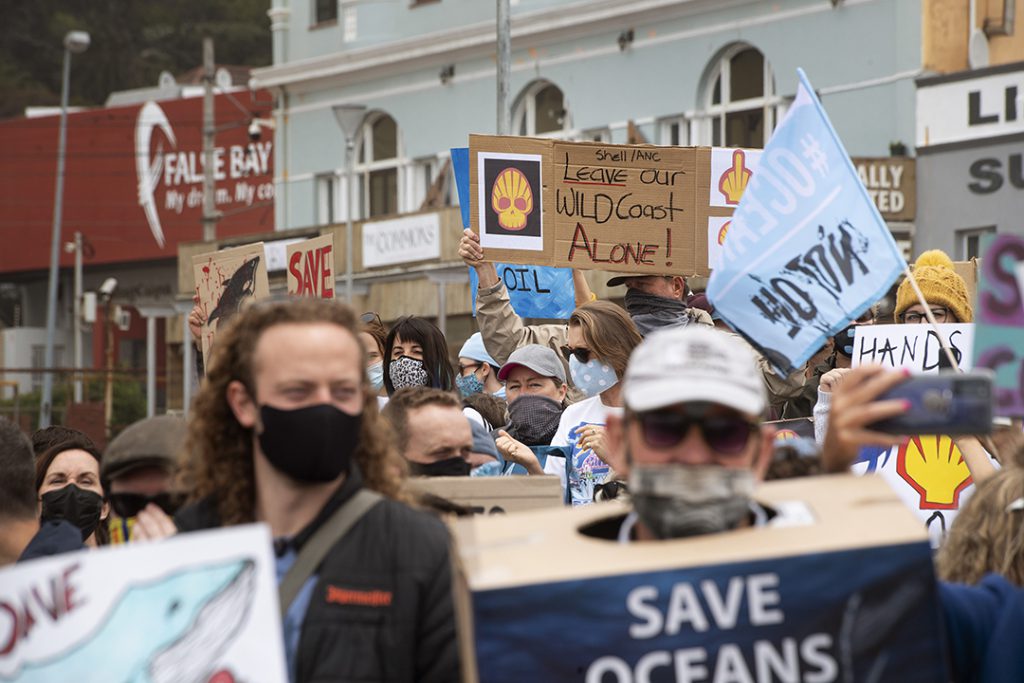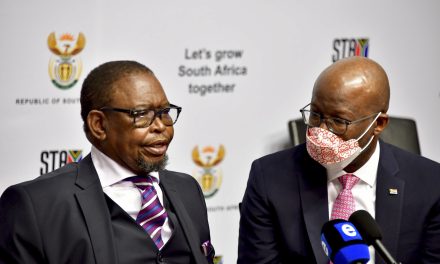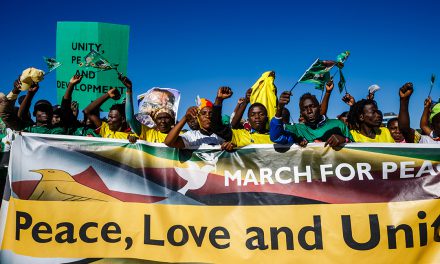South Africa’s recent climate diplomacy efforts have made international headlines. The national government has portrayed a real seriousness towards a developmental transition to a clean energy strategy. South Africa’s ambition to be the continent’s frontrunner on climate ambition is admirable, but the recent High Court judgment against Shell paints a different picture.
The judgment comes after civil society, community members and ordinary citizens protested the permission given to Shell South Africa to conduct an ocean seismic survey in search of oil and gas reserves. This begs the question: are South Africa’s energy and mineral extraction polices aligned with its transnational climate commitments?

Hundreds of people take part in a protest against the plan by Dutch oil company Shell to conduct underwater seismic surveys along South Africa’s East coast, at Muizenberg Beach, in Cape Town, on 5 December 2021. Photo: RODGER BOSCH/AFP
At present, there is a disconnect between South Africa’s transnational climate commitments and the opinion of its Department of Mineral Resources and Energy on the future of the country’s energy sector. Minister Gwede Mantashe, South Africa’s Mineral Resources and Energy Minister, has earned the label “coal fundamentalist” by the media for his loyalty to coal as South Africa’s primary energy resource until at least 2030.
His promise for a transition to a low-carbon economy is laid out in his department’s 2019 Integrated Resource Plan, which involves the development of new and more “efficient” coal power projects that will comply with climate and environmental requirements. As it stands, South Africa has the most carbon intensive electricity generation in the world. This is no accident. As Tyler and Hochstetler (2021) illustrate in their research, South Africa’s dependency on coal is part of a complex set of political, institutional and corporate interests, which is tied up with the constraints of existing infrastructure and vested interests in maintaining this dependency.
In a previous Wicked Conversation campaign article, my research argued that transnational climate governance and environmental ministries are complementary. Committing to reducing CO2 emissions is important, but it must be reinforced by domestic environmental ministries, who are ultimately responsible for creating actionable policies that align with the country’s global commitments.
The Paris agreement is unique in that it centres around nationally determined contributions (NDCs) by signatories. These ambitions are then acted upon by the relevant environmental institutions within the state. However, the institutionalisation of climate change commitments is not exactly clear cut. In South Africa, the climate governance challenge involves the reorientation of existing institutional structures, not only the creation of specialised climate institutions such as the Presidential Climate Commission.
The authorisation by the Department of Mineral Resources and Energy (DMRE) for Shell to conduct a seismic survey off the Wild Coast of the Eastern Cape indicates a deeper issue of misalignment between South Africa’s domestic energy ambitions and its high-level climate change contributions. A letter written by Oceans Not Oil (ONO) lays out clear missteps by the Department and the Ministry of Environmental Affairs which granted Exploration Right 12/3/252. The granting of the permit was made back in 2014 and there was no communication of this to the public and civil society at large until 2 November 2021.
Research indicates that the Joint Nature Conservation Committee (JNCC) guidelines for minimising the risk of injury to marine mammals from geophysical surveys lacks rigorous scientific efficacy and is mainly concerned with the immediate impacts, failing to account for more insidious impacts likely to arise in the long term. The JNCC also fails to mitigate against the impact on turtles. In the case of this seismic survey, it would coincide with the hatching of loggerhead and leatherback turtles, both of which are endangered.
Furthermore, as a requirement for implementation of mitigation measures, the fishing industry and other small-scale fisheries were meant to be consulted and given copies of the exploration license, but this was not done. Additionally, consultations with community members, not only community leaders, failed to happen after the Makhanda High Court ruled in favour of blocking the surveys from happening.
Since the submission of the final Environmental Management Programme (EMPr) in 2013, there have been significant changes to South Africa’s immediate natural environment. The country is increasingly experiencing more frequent drought, coastal erosion and flooding, compounded with the fact that warming has occurred at twice the rate of the global average. The Intergovernmental Panel on Climate Change (IPCC) recently published the second part of its sixth report emphasising the impact of climate change on the African continent, detailing with high confidence that extreme weather events will continue if action is not taken. Within the IPCC reports, scientists warn that continued exploration for oil and gas production will only exacerbate these issues and delay decarbonisation.
South Africa’s global commitments to tackling climate change cannot be taken seriously if its domestic environmental institutions themselves do not internalise these commitments. Minister Mantashe argues that the R131-billion pledge from the United States and Europe cannot compete with the annual revenue made by the coal mining industry. This is a false equivalence. It demonstrates a misunderstanding of the opportunity costs of continued coal mining and burning. It locks the country into an emissions trajectory that not only makes a mockery of our international commitments, but also ignores the daily negative externalities associated with coal. His interests, along with those invested in South Africa’s energy sector, cannot foreshadow the urgent need to pivot the emissions trajectory of the country.
The Shell judgment paints a bigger picture of the unwillingness and incapability of South Africa’s domestic environmental institutions to tackle the challenge of a just energy transition. Our climate institutions must embody the strong scientific and technical planning capacity of its scientists and researchers who are willing and able to provide a pathway towards decarbonisation. Mega-coal projects like Medupi and Kusile set the country in the wrong direction and further entrench a dependency on coal – reliance on a single non-renewable energy source has proven unsustainable and poorly governed as the country continues to experience periodic loadshedding.
Ultimately, South Africa’s energy sector continues to endure a complex political economy that makes institutional transformation difficult. Minister Gwede Mantashe’s intransigence does not spell good news for a just energy transition in South Africa, and highlights the need for climate institutions to increase their influence in institutions where climate governance is not their primary objective, particularly the ones which dominate emissions and power.
[activecampaign form=1]
Monique Bennett holds a Master’s degree in International Relations from the University of the Witwatersrand. She is currently pursuing her Doctorate in Political Science at Stellenbosch University funded by the Peace Research Institute of Oslo. She enjoys a mixed-methods approach to research across topics such as governance, environmental issues, human security and peacebuilding within the African context. She supports her research team by providing data-driven evidence for their research/op-eds and writes for various South Africa news outlets.












